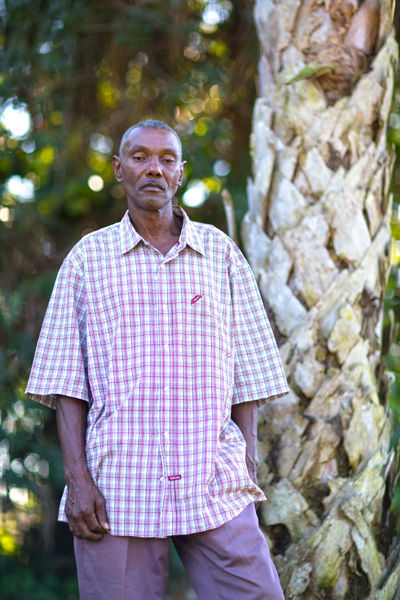INDIAN RIVER COUNTY — During his trial in June, 2011, Wabasso resident Robert Taylor could not have guessed how things would reverse themselves three years later, when he would swap roles with the sheriff’s deputy whose testimony helped convict him of a felony.
But that’s exactly what happened in early December when a Miami federal judge ordered former Indian River County sheriff’s deputy David Wright to pay Taylor $100,000 for violating his civil rights when he used excessive force, repeatedly Tasing him.
“At least here in Vero Beach in my case, justice was served,” said Taylor, 52, who works for a lawn maintenance company.
The four-year saga began on Christmas night, 2010, when Taylor was walking home after going to his family’s traditional Christmas dinner at his brother’s house. As he walked along the side of the road in Wabasso, deputy Wright pulled up in his cruiser and yelled at Taylor to come to the car.
What happened next is up for grabs: Wright said he stopped Taylor because he appeared drunk and took off running when he called to him. Wright caught up with him, he testified, and a fight ensued, with Wright using his Taser as the two scuffled.
But Taylor said he was not drunk and ran because Wright used his Taser without reason in the very beginning.
When Wright missed, he yelled for Taylor to stop, which Taylor said he did, fearing he’d be shot. Taylor said he lay on his stomach on the ground with his legs spread and arms behind him to be handcuffed.
But, said Taylor, after he was handcuffed and in complete compliance, Wright shot him in the back with his Taser at least eight times. Taylor was then arrested and charged with violently resisting arrest and cocaine possession, after Wright discovered a small amount of cocaine in Taylor’s pocket.
At Taylor’s criminal trial, Wright said he had to repeatedly shoot Taylor with the Taser because Taylor was fighting and trying to overcome him. But multiple Taser burns on Taylor’s back and on the backs of his arms told a different story, which supported Taylor’s version of events.
An Indian River County jury convicted Taylor of cocaine possession but lowered the resisting arrest with violence charge to simply resisting arrest.
Taylor, who had prior marijuana and cocaine possession convictions, went to a state correctional facility in northwest Florida for three years.
During that time, according to records, he had frequent nosebleeds, high blood pressure and migraine headaches, which he had not had before the repeated Tasing.
He also had nightmares and emotional trauma over his helplessness at the hands of the deputy and vowed to use the law to get justice.
“It wasn’t right for the deputy to do that to me when I was handcuffed and lie about it,” he said. “I wanted a jury to look at it.”
From prison, without help of a lawyer, Taylor filed a neatly hand-printed case in federal court that said Wright had violated his civil rights.
When Miami attorney Randall Berg, director of the Florida Volunteer Lawyers Project, saw it, he wanted to get Taylor a free lawyer.
On Nov., 14, 2011, Daniel Enriquez, a Miami attorney for the high-powered Florida law firm Carlton Fields, filed a federal civil rights case for Taylor against Wright, another deputy and the Indian River County Sheriff’s Office.
But as the case meandered through the justice system, Enriquez dropped the second deputy because of questions about when he arrived on the scene. He also dropped the sheriff’s office from the suit because of no evidence of a pattern of excessive force with Tasers in the department.
The Indian River Sheriff’s office logged in over 200,000 calls for possible criminal offenses in 2013 and 2014, with only 52 Taser deployments over the two years – a low number compared to other law enforcement agencies.
With Wright as the lone defendant, his attorneys called for the case to be dismissed in late 2012.
But U.S. Magistrate Judge Patrick White disagreed: “The Eleventh Circuit has consistently held that the gratuitous use of force when a criminal suspect is restrained and/or not resisting arrest constitutes excessive force,” he wrote in a January opinion denying the dismissal of the case.
In December, 2011, six months after Taylor was convicted and went to prison, Wright resigned from the sheriff’s office after an internal affairs investigation showed that he used police equipment to follow women.
Then in September, 2013, sheriff’s deputies arrested Wright after a sting, which led to his being charged with coercion or enticement of a minor, which is a felony. He was released on bond, and his trial was set to begin in June, 2014. But on the first day of the trial, Wright fled to Mexico, then disappeared.
A few weeks ago, a federal judge in Miami ordered Wright to pay Taylor $100,000, which, despite Wright’s disappearance, is likely to come from the insurance coverage he had while he was serving as a sheriff’s deputy.
“Getting that money for what I went through would be nice, but I’m mainly happy Wright didn’t get away with excessive force,” said Taylor. “There are some good cops here in Vero, but he wasn’t one of them.”

